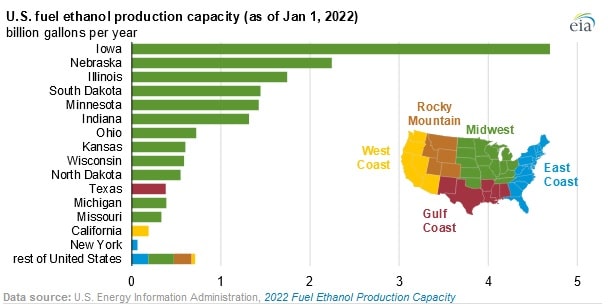Fuel Ethanol Accounts For 81 Percent of U.S. biofuels Production Capacity: EIA

The U.S. biofuel production capacity as of Jan. 1, 2022, stood at 21 billion gallons per year from 275 facilities, with over 80 percent of the capacity for fuel ethanol, according to an Aug. 22 report from the U.S. Energy Information Administration. About 81 percent of the nation’s total biofuels capacity comes from fuel ethanol producers, 11 percent from biodiesel producers, and 8 percent from renewable diesel fuel producers and other biofuels manufacturers.
Among the 13 states that have the highest capacity for producing fuel ethanol, 12 of them are in the Midwest region. Half of the nation’s ethanol production capacity is concentrated in three states namely, Nebraska, Iowa, and Illinois. The fuel ethanol production capacity was 17.4 billion gallons per year at the start of the year, a decrease of 200 million gallons per year since Jan. 1, 2021.
The production of biodiesel in the country totaled 2.3 billion gallons per year from 72 plants in January 2022, a decline of 0.2 billion gallons per year from the previous year. Illinois, Iowa, and Missouri account for more than half of the U.S. biodiesel production capacity with the rest mostly located on the West and Gulf coasts.
A much smaller segment of biofuel production included 11 producers operating in the U.S. A variety of biofuels and bio intermediates are produced at the facilities, including renewable diesel fuel, renewable heating oil, renewable jet fuel, renewable naphtha, and renewable gasoline. Combined, their production capacity is 1.8 billion gallons per year, more than double what it was in 2021.
The Biden administration considers biofuels as an important pathway to meet climate goals for a cleaner future by expanding the volume of low-carbon biofuels available across the entire transportation sector. The recently passed Inflation Reduction Act is expected to make advancements in the biofuels sector by providing grants and tax credits. The act:
- Provides a $500 million grant to increase the sale and use of agricultural commodity-based fuels by improving infrastructure for blending, storing, supplying, or distributing biofuels; this includes retrofitting or upgrading fuel dispensers to supply higher blends of biofuels.
- Establishes a $297 million competitive grant program to support alternative aviation fuels and low-emission aviation technologies.
- Provide $5 million to the U.S. Environmental Protection Agency to carry out the Renewable Fuel Standard program and for data collection and analyses for lifecycle greenhouse gas emissions of a fuel.
- Offers $10 million to support investments in advanced biofuels.
- Creates a clean fuel production credit from 2025 through 2027.
- Establishes a sustainable aviation fuel tax credit for the years 2023 and 2024, setting a base amount of $1.25 per gallon for fuels that achieve a 50 percent greenhouse gas reduction when compared to a baseline fossil fuel; provides a supplemental credit of $0.01 per gallon for each percentage point by which the emissions reduction exceeds the 50 percent level for a maximum potential per-gallon credit of $1.75.
EnerKnol Pulses like this one are powered by the EnerKnol Platform—the first comprehensive database for real-time energy policy tracking. Sign up for a free trial below for access to key regulatory data and deep industry insights across the energy spectrum.
ACCESS FREE TRIAL